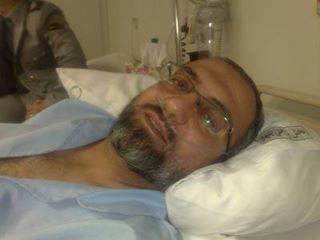Iran Opinion: The Hunger Strike of Mehdi Khazali
 The first thing I notice about the photographs of Mehdi Khazali is the smile. In an Iran where people in their 40s and 50s, especially those with any kind of clout, tend to be serious men, his demeanour is one of calm, but relaxed determination.
The first thing I notice about the photographs of Mehdi Khazali is the smile. In an Iran where people in their 40s and 50s, especially those with any kind of clout, tend to be serious men, his demeanour is one of calm, but relaxed determination.
That determination is not only evident on his face. It has been in his life. Soon it might be in his death.
Today will be the 58th day of Khazali's hunger strike, a response to a 14-year sentence with a mandatory 10-year exile and 90 lashes, a response to the deprivation of his rights and those of others.
Khazali is a doctor, a publisher, a blogger, and one of the harshest critics of Iran's regime, defying the risks to stand up to tyranny and speak his mind. That criticism spiked after the 2009 Presidential elections, and he was summoned to court for his blog posts. The "crime" in one of them was to question whether Mahmoud Ahmadinejad's family had been Muslim for generations or were recent converts from Judaism.
After one of his many court appearances kast July, the judge issued an order for him to his re-arrest. His body hurting from the beating he had suffered at the hands of regime-enforcers, Khazali addressed the judge defiantly:
You are an Intelligence Ministry agent. Even though my neck is broken and swollen, I won't request medical treatment. I will start a hunger strike as of today and will leave my corpse for you to carry on your shoulders.
Khazali was released on bail, only to be detained again in January. True to his word, he began the hunger strike in Evin Prison's Ward 350. On Monday, he began refusing water as well.
A week ago Khazali, a veteran of the Iran-Iraq War of the 1980s, wrote a letter to his wife, meshing his current suffering with Iran's in that conflict:
February 27 is our anniversary and the 50th day of my hunger strike. Twenty five years ago, with much passion and enthusiasm, bearing a beautiful cannon ball as a gift for my bride, I set out to go from Dokouhe to Andimeshk railroad station. The railroad security confiscated the cannon ball, and in the meantime the train left the station.
I returned to the base. This time I picked up an anti-tank mine with beautiful flowers painted on it as a gift for my wife.
With great difficulty and hardship I set out to go to Tehran. Part of the way, I spent on the back of a Sepah [Revolutionary Guards] land-cruiser. Part of the way, I traveled in a trailer that was returning from the front lines. He stopped at a police station to sleep.
In the cold of February, I kept my hands warm by the exhaust pipes of the buses that had stopped to punch their time cards.
I traveled with the air defense unit to Brojerd tri-section. The unit did not stop for morning prayers, so inevitably I got off.
We were far from the war zone, it was morning, and I got on a bus that was going to Tehran.
On February 27, 1986, the Imam performed our matrimonial ceremony and two Qur'ans were adorned with the Imam’s signature for the bride and the groom. The Imam’s wife gave the bride a coin as a gift.
That day, my gift was the anti-tank mine that was decorated with beautiful painted flowers symbolizing the peace after the war.
My darling, today this former Basiji is in captivity, in the hands of those who have never seen the front lines.
Today I continue my relentless battle in the trenches of Ward #350. It has been sometime that I have been deprived of seeing you and hearing your voice. They intend to take my life, and I am ready for the sacrifice.
This time I have a new gift for you from 350. It’s the handcrafted work of incarcerated noble men.
These gloomy dark days shall pass. When you do see the gift from Ward 350, remember this dark period of time in history and tell our children of the people who made self-sacrifices to create a free and prosperous future.
With the hopes for a brighter tomorrow for our beloved Iran.
On Wednesday, activists plan to raise awareness through social media about Khazali and his hunger strike. The hope is that human rights organizations and Western governments will press the Iranian regime to release Khazali before he perishes. One activist told me, "This is our only hope of saving him."

 Tuesday, March 6, 2012 at 9:56
Tuesday, March 6, 2012 at 9:56
Reader Comments